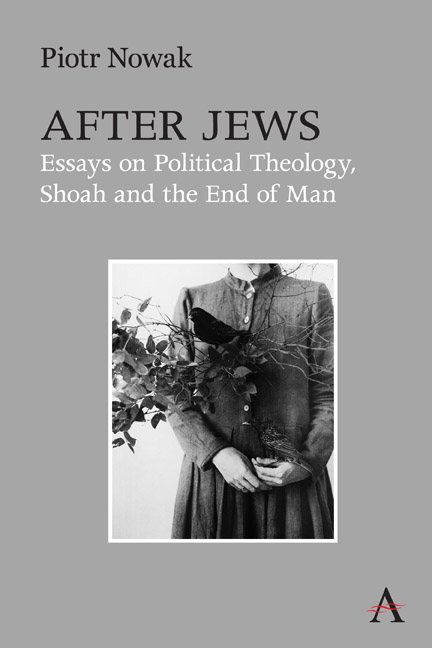Book contents
- Frontmatter
- Contents
- Preface
- Chapter 1 The Chosen Ones
- Chapter 2 The Secret of the Scapegoat
- Chapter 3 Making a Jew into a Christian
- Chapter 4 There Should Be Time No Longer
- Chapter 5 To Look Upon His Face and Yet Not Die
- Chapter 6 Ex oriente lux?
- Chapter 7 Pilloried by Necessity
- Chapter 8 German Rubble
- Chapter 9 Long Live!
- Chapter 10 The Living against the Dead
- Chapter 11 The Child of War
- Chapter 12 Plenty Coups and the End of the World
- Chapter 13 They Refugees
- Chapter 14 The Remainder of Christianity
- Bibliography
- Index of Persons
Chapter 7 - Pilloried by Necessity
Published online by Cambridge University Press: 13 May 2022
- Frontmatter
- Contents
- Preface
- Chapter 1 The Chosen Ones
- Chapter 2 The Secret of the Scapegoat
- Chapter 3 Making a Jew into a Christian
- Chapter 4 There Should Be Time No Longer
- Chapter 5 To Look Upon His Face and Yet Not Die
- Chapter 6 Ex oriente lux?
- Chapter 7 Pilloried by Necessity
- Chapter 8 German Rubble
- Chapter 9 Long Live!
- Chapter 10 The Living against the Dead
- Chapter 11 The Child of War
- Chapter 12 Plenty Coups and the End of the World
- Chapter 13 They Refugees
- Chapter 14 The Remainder of Christianity
- Bibliography
- Index of Persons
Summary
At forty the bladder beginning to leak—
was it for such louts, do you think, that the earth
grew from sun to moon—?
There are books that should be required reading but—let us not kid ourselves—not at all times and not for everyone. I mean books that grow out of a radical experience, from facing an event too rich in meanings or, conversely, devoid of any meaning at all, not making any sense. Jean Améry's writing belongs in the second category. A response to the absurdity of the twentieth-century history, it constitutes its ultimate result. Améry is not a historian, or, if he is one, he is the historian of his own suffering. He infects us with a knowledge that then becomes addictive; we can no longer do without it. It is the kind of knowledge one does not inherit, but painstakingly acquires.
The Loss of Language
In At the Mind's Limits, his only book where he explicitly refers to his incarceration, first at Fort Breendonk, then in Auschwitz, Améry tries, in my opinion, to relate the helplessness of his mind, its uselessness and powerlessness in face of extreme oppression. Because only in the fiery pit of genuine hell one learns whether the mind—thinking, rationality—is everything or serves no purpose at all.
Intellectuals, that is, a certain species of creatures for whom the “natural” environment is the system of intellectual references—be it a poem, some sheet music or Bach's Brandenburg Concertos—usually trust the power of their intellect as it constitutes an important support, hell; in fact it is their lives’ very essence.
In the first chapter, “At the Mind's Limits,” Améry revises this view. There are conditions, he says, in which the mind is of no use; it can even do harm. In a death camp, for someone suffering from cachexia, the mind is not just useless; it actually lowers one's chances of survival. An intellectual who in his previous life worked with his brains not his hands cannot cope with the new kind of work that mainly consists in digging holes and backfilling them.
- Type
- Chapter
- Information
- After JewsEssays on Political Theology, Shoah and the End of Man, pp. 99 - 108Publisher: Anthem PressPrint publication year: 2022

